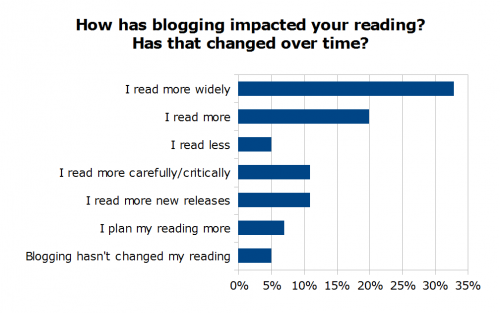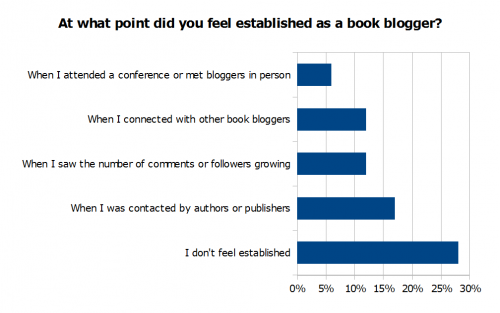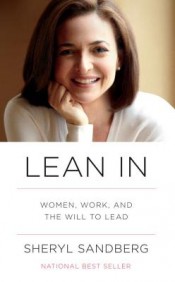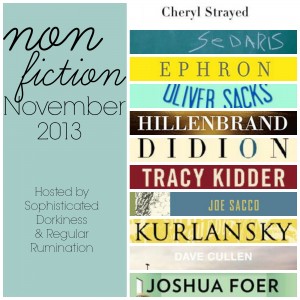First of all, apologies to everyone who reads this blog who isn’t a book blogger. I feel like this week has been pretty blogger-centric, which isn’t my usual posting plan. But since Nonfiction November officially kicks off on Monday, I can almost guarantee I’ll be back to talking about the thing everyone cares about, books, soon.
With that out of the way, I’m really excited to share the last of the posts about the results of a book blogger survey that Shannon (River City Reading), Jennifer (Literate Housewife) and I put together last month. If you’ve missed it, we’ve had three posts with survey results so far:
If you haven’t checked out this posts, I highly encourage you to do so. While some of the responses led to more questions, I think there are some interesting points there too.
In this last post, I’m going to look at the responses to two of the open-ended questions that we asked about reading habits and what it takes to feel like an established blogger. Since these questions were open-ended, we got a huge variety of responses. I tried to go through a “code” each one based on the general sentiment to see if there were any trends. After each graph, I’ll try to share some more of the specifics that I noticed.

The most common response to our first question was that blogging has led about 33 percent of book bloggers to read a larger variety of books than they previously read. There were many examples, but most specifically mentioned trying new genres or finding new favorite authors because of book blogging. While a good number of bloggers said they read more (about 20 percent), others said they read less because they spend reading time working on reviews or blog projects.
About 12 percent of the responses I tallied mentioned reading more new releases, or being familiar with upcoming or “buzzy” books. A small number, about 5 percent, specifically said that blogging has not impacted their reading at all.
It’s important to note that all of these things (aside from reading widely) had comments that were positive and negative. For example, many bloggers who said they read more also mentioned that they felt some pressure to read more or faster so they always had blog content. Others who said they read more critically (reading with a blog post or review in mind) said they missed just reading for pleasure. There were also bloggers who said they missed the serendipity that comes with reading backlist titles. And several bloggers mentioned they spend less time re-reading or reading long books as a result of pressures from book blogging.
People had many really articulate things to say on this front. These were some of my favorite comments:
- “Can I just share the BEST thing about my blog? All my life I have been considered “odd” (aka “too smart”) because I read voraciously. Through blogging I have met SO MANY kindred spirits — amazing people who read as much and more than I do. I love love love the fact that my blog has connected me with people who love and appreciate books as much as I do, without thinking all that reading is “weird”. :)”
- “The books I read for review are less enjoyable because I have to approach them differently and take notes. I also pay more attention to quality of writing, and when a story is poorly written, I struggle and even become depressed about giving bad reviews, because people worked hard to write these books, even if I do think they’re garbage.”
- “I read so much more now. I’ve upped reading on my priorities list when it comes to my free time. This means less television and movie watching – less sitting around doing nothing.”
- “I feel like the only books I’m reading these days are ARCs. I have a list, in Microsoft Word of all the ARCs in my possession, separated by month of publication. Every time I review one, I cross it off the list and feel a tremendous feeling of satisfaction. But I wonder what things will be like when I don’t have any ARCs left to review – when the page is completely wiped clean. Freedom in my reading choices is hard to imagine – and when did it get like this?”
- “I’m not rereading as much as I used to, and it’s the one thing about blogging I dislike the most. I’m not sure how or if I can fix it, but I’m going to try my best.”

Another open-ended question we asked was whether there was a point that bloggers felt established. I didn’t tally how many people mentioned a specific date or number of years since I didn’t think that was especially telling. Instead, I looked at what kinds of events make bloggers feel like they’ve “made it.” Common responses included being contacted by authors and publishers, seeing the number of followers or comments growing, and connecting with other bloggers. A small number of people mentioned meeting bloggers in person or attending a major conference like Book Expo America.
The most interesting thing to me, however, is that nearly a third of bloggers who responded said they didn’t feel established at all. And this isn’t just an age thing — bloggers of all ages and experience levels reported feeling like they weren’t really established. While that could just be in the nature of the question, I also think there’s something comforting in the idea that there are many of us who don’t feel like we’ve really made it yet.
Actually, another interesting thing: getting contacted by publishers and being part of “the industry” is also a pretty big piece of making a blogger feel established, particularly for bloggers who have been writing between 1 and four years. As much as we sometimes want to get away from the whole publishing thing, getting your first ARC or e-mail from a publisher is still considered a milestone for a good chunk of bloggers.
Here are a few representative comments in full:
- “I still sometimes struggle with feelings that I’m not doing enough, or well enough, especially in comparison with other bloggers. And I try very hard not to pay too much attention to stats like page hits and number of followers, because although they’re going up, they’re going up very slowly. I try to remember that I don’t blog for the numbers; I do it because I enjoy it.”
- “I started blogging about books before ARCs and all of the pressure associated with publishers/authors/books. While I occasionally accept books for review I do not let it get in the way of my reading pleasure and would much rather read books from my shelf. Because of this I think I have a different idea of book blogging than some of the newer folks? I’ve always been a book blogger but I don’t know how “established” others would consider me.”
- “I felt comfortable after a year, confident after around 18 months, and in my third year I finally gave up caring too much about my stats, enjoying blogging just for the sake of being part of the community.”
- “About six months after I started blogging I saw that book bloggers were much more supportive than any other genre of blogging for me. I felt like ‘one of the gang’ pretty quick but I still feel I run a small blog.”
I’m not really sure how to conclude this. I’m so happy we were able to get so many bloggers to participate. I think they are a few questions we wish we’d asked differently or could have dug into further, but overall I’m pretty proud of this project and what we’ve been able to learn about the current state of book blogging.
I’d still love some enterprising Ph.D student to do a dissertation on the book blogging community though. Wouldn’t that be awesome?


 Welcome to the first official week of
Welcome to the first official week of  It’s an absolutely heartbreaking, frustrating, touching story. What struck me the first time I read it was how careful Fadiman was to make it clear that there are no villains here, just good people forced into difficult circumstances with even more difficult decisions. There are certainly ways in which the family and medical professionals could have done better, but Lia’s eventual medical outcome wasn’t a result of malpractice or neglect. It was just a tragedy.
It’s an absolutely heartbreaking, frustrating, touching story. What struck me the first time I read it was how careful Fadiman was to make it clear that there are no villains here, just good people forced into difficult circumstances with even more difficult decisions. There are certainly ways in which the family and medical professionals could have done better, but Lia’s eventual medical outcome wasn’t a result of malpractice or neglect. It was just a tragedy.
